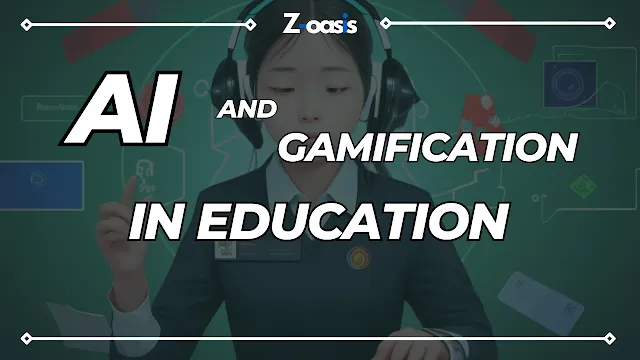Imagine for a moment blending the thrill of gamification in Education. No, it's not child's play. It's called gamification, and when combined with the power of artificial intelligence (AI), it transforms stories from the classroom into a fascinating adventure. We will delve into the numerous benefits and intriguing applications of embracing this dynamic duo in the education sector.
 |
| The Perfect Blend of AI and Gamification in Education |
An Individualized Approach to Learning with Gamification
The beauty of introducing gamification in Education is its potential to offer a tailor-made experience for every student. Picture an AI-driven gamification platform that sifts through parameters like a student's performance, course preferences, or learning style. It modifies the game content and challenges in line with every individual’s unique requirements.
Such an AI-facilitated system keeps the e-learning involved and challenging by adapting the game's difficulty level, tempo, and content. It aligns the game so perfectly with the student's optimal knowledge absorption level, sparking their interest and keeping their minds stimulated.
AI also offers real-time feedback during the learning process. Intelligent software can interpret student responses, aiding them in recognizing their mistakes and nudging them in the correct direction. This kind of personalized feedback enhances learning and encourages learners to self-reflect, developing their metacognitive skills.
Fueling Motivation and Participation through Gamification
The charm of a game is its ability to draw people into participating actively and voluntarily. Incorporating elements like points, levels, badges, and leaderboards into AI-backed gamification platforms makes learning feel like an exciting journey. The competitive aspect, the sense of accomplishment, can trigger students to invest more, chase higher scores, and dive into friendly competition with peers.
With gamification, learning evolves from monotonous reading to a multi-dimensional, immersive game experience. These interactive experiences hold the learners' interest, making the absorption of information enjoyable and intriguing. This boost in interest and participation can significantly improve students' learning outcomes and mold a more positive perspective towards education.
Optimized Learning & Progress Evaluation with AI
AI-powered gamification offers a solution compatible with each student's individual learning speed and progress. It performs a comprehensive analysis of the student's behavior and performance data, adjusting the game's difficulty and content to ensure an optimal learning experience. This adaptability offers the golden opportunity to learn at your own pace and receive suitable assignments.
AI also tracks student progress in real-time, identifying their strong points, and highlighting potential areas of weakness. These insights can catalyze targeted intervention, additional practice, or support where needed, allowing learners to effectively tackle the academic hurdles they might face.
Fostering Collaboration and Social Learning
Education-based gamification can be a stepping stone for instilling a sense of community and fostering cooperative learning amongst students. Integrating multiplayer capabilities into AI-driven gamification platforms fosters interactions and competition among peers, further enriching their learning process.
AI can enable social learning by distributing tips and recommendations, considering the performance and achievement patterns of peers in a collective dataset. This encourages the embracing of community learning and shared educational objectives.
Facilitation of Learning Assessments and Feedback
Proactive student learning assessment and feedback are critical aspects of any educational system. AI-driven gamification platforms have significantly streamlined these processes. Continuous monitoring and evaluation of a student's performance enables the generation of detailed progress reports. These feedback insights assist in identifying knowledge gaps, and helping teachers and students adjust their learning strategies accordingly.
Furthermore, AI can simplify the grading process, closely analyzing student responses and accurately assigning grades based on predetermined benchmarks. This automated process not only conserves teachers' effort and time but ensures fairness and consistency in evaluating performance.
Considering Ethics in Gamification and AI-Enabled Education
Although the blessings of gamification and AI applications in education are various, contemplating the ethical aspects accompanying their implementation is also essential. Privacy protection and data security top the list. It's paramount for any educational entity to responsibly handle student data, strictly abiding by privacy regulations.
Other critical ethical considerations involve algorithmic fairness and bias. Any AI-driven gamification platform should be inclusively designed, ensuring every learner receives equal opportunities, irrespective of background or capability. Regular monitoring and evaluation is an absolute must to prevent any inadvertent perpetuations of discrimination or bias.
In addition, one cannot overlook the significance of transparency in AI functionalities. A lucid understanding of the AI operations at both student and teacher levels enhances trust and confidence in these systems. To encourage this, learners and educators should be offered rational explanations for any algorithmic decisions and actions.
In conclusion, intertwining gamification with AI unfolds a world of potential, redefining education with robust, individualized, and interactive learning experiences. With an emphasis on ethical aspects, privacy, fairness, and openness, this blend offers students a plethora of advantages, including personalized learning, boosted motivation, optimum adaptive learning, efficient collaborations, and automated assessments.